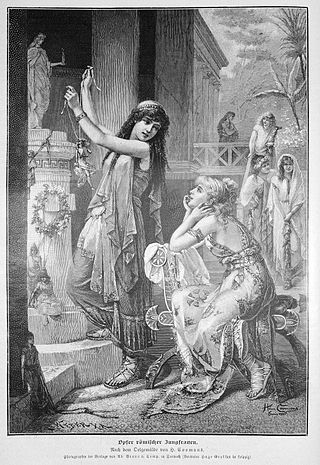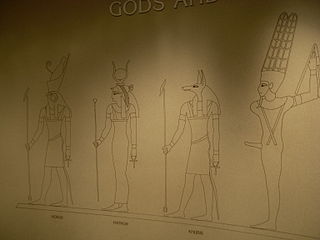Related Research Articles

Modern paganism, also known as contemporary paganism and neopaganism, is a term for a religion or a family of religions which is influenced by the various historical pre-Christian beliefs of pre-modern peoples in Europe and adjacent areas of North Africa and the Near East. Although they share similarities, contemporary pagan movements are diverse and as a result, they do not share a single set of beliefs, practices, or texts. Scholars of religion often characterise these traditions as new religious movements. Some academics who study the phenomenon treat it as a movement that is divided into different religions while others characterize it as a single religion of which different pagan faiths are denominations.

Paganism is a term first used in the fourth century by early Christians for people in the Roman Empire who practiced polytheism, or ethnic religions other than Judaism. In the time of the Roman empire, individuals fell into the pagan class either because they were increasingly rural and provincial relative to the Christian population, or because they were not milites Christi. Alternative terms used in Christian texts were hellene, gentile, and heathen. Ritual sacrifice was an integral part of ancient Graeco-Roman religion and was regarded as an indication of whether a person was pagan or Christian. Paganism has broadly connoted the "religion of the peasantry".
Theism is broadly defined as the belief in the existence of at least one deity. In common parlance, or when contrasted with deism, the term often describes the classical conception of God that is found in monotheism — or gods found in polytheistic religions — a belief in God or in gods without the rejection of revelation as is characteristic of deism. Gnosticism is the belief in personal spiritual knowledge.

Religious humanism or ethical humanism is an integration of nontheistic humanist ethical philosophy with congregational rites and community activity which center on human needs, interests, and abilities. Self-described religious humanists differ from secular humanists mainly in that they regard the nontheistic humanist life stance as a non-supernatural "religion" and organising using a congregational model.

Hellenism in a religious context refers to the modern pluralistic religion practiced in Greece and around the world by several communities derived from the beliefs, mythology and rituals from antiquity through and up to today. It is a system of thought and spirituality with a shared culture and values, and common ritualistic, linguistic and literary tradition. More broadly, Hellenism centers itself on the worship of Hellenic deities, namely the twelve Olympians.
Nontheism or non-theism is a range of both religious and non-religious attitudes characterized by the absence of espoused belief in the existence of a God or gods. Nontheism has generally been used to describe apathy or silence towards the subject of gods and differs from atheism, or active disbelief in any gods. It has been used as an umbrella term for summarizing various distinct and even mutually exclusive positions, such as agnosticism, ignosticism, ietsism, skepticism, pantheism, pandeism, transtheism, atheism, and apatheism. It is in use in the fields of Christian apologetics and general liberal theology.
Euhemerism is an approach to the interpretation of mythology in which mythological accounts are presumed to have originated from real historical events or personages. Euhemerism supposes that historical accounts become myths as they are exaggerated in the retelling, accumulating elaborations and alterations that reflect cultural mores. It was named for the Greek mythographer Euhemerus, who lived in the late 4th century BC. In the more recent literature of myth, such as Bulfinch's Mythology, euhemerism is termed the "historical theory" of mythology.
Jewish atheism refers to the atheism of people who are ethnically and culturally Jewish. Contrary to popular belief, the term "Jewish atheism" is not a contradiction because Jewish identity encompasses not only religious components, but also ethnic and cultural ones. Jewish law's emphasis on descent through the mother means that even religiously conservative Orthodox Jewish authorities would accept an atheist born to a Jewish mother as fully Jewish.
Nature Prakṛti worship also called naturism or physiolatry is any of a variety of religious, spiritual and devotional practices that focus on the worship of the nature spirits considered to be behind the natural phenomena visible throughout nature. A nature deity can be in charge of nature, a place, a biotope, the biosphere, the cosmos, or the universe. Nature worship is often considered the primitive source of modern religious beliefs and can be found in pantheism, panentheism, deism, polytheism, animism, Taoism, totemism, Hinduism, shamanism, some theism and paganism including Wicca. Common to most forms of nature worship is a spiritual focus on the individual's connection and influence on some aspects of the natural world and reverence towards it. Due to their admiration of nature, the works of Edmund Spenser, Anthony Ashley-Cooper and Carl Linnaeus were viewed as nature worship.
Transtheism refers to a system of thought or religious philosophy that is neither theistic nor atheistic, but is beyond them. The word was coined by either theologian Paul Tillich or Indologist Heinrich Zimmer.
Antitheism, also spelled anti-theism, is the philosophical position that theism should be opposed. The term has had a range of applications. In secular contexts, it typically refers to direct opposition to the belief in any deity.
Atheism, in the broadest sense, is an absence of belief in the existence of deities. In a narrower sense, atheism is specifically the position that there are no deities and any statements to the contrary are false ones. The English term 'atheist' was used at least as early as the sixteenth century and atheistic ideas and their influence have a longer history.

Polytheistic reconstructionism is an approach to modern paganism first emerging in the late 1960s to early 1970s, which gathered momentum starting in the 1990s. Reconstructionism attempts to re-establish genuine polytheistic religions in the modern world through a rediscovery of the rituals, practices and contextual worldviews of pre-Christian Pagan religions. This method stands in contrast with other neopagan syncretic movements like Wicca, and ecstatic/esoteric movements like Germanic mysticism or Theosophy.

Implicit atheism and explicit atheism are types of atheism. In George H. Smith's Atheism: The Case Against God, "implicit atheism" is defined as "the absence of theistic belief without a conscious rejection of it", while "explicit atheism" is "the absence of theistic belief due to a conscious rejection of it". Explicit atheists have considered the idea of deities and have rejected belief that any exist. Implicit atheists, though they do not themselves maintain a belief in a god or gods, have not rejected the notion or have not considered it further.

The term Urmonotheismus or "primitive monotheism" expresses the hypothesis of a monotheistic Urreligion, from which polytheistic religions allegedly degenerated. This evolutionary view of religious development contrasts diametrically with another evolutionary view on the development of religious thought: the hypothesis that religion progressed from simple forms to complex: first pre-animism, then animism, totemism, polytheism, and finally monotheism.
The following outline is provided as an overview of and topical guide to atheism:
Atheism, in the broadest sense, is an absence of belief in the existence of deities. Less broadly, atheism is a rejection of the belief that any deities exist. In an even narrower sense, atheism is specifically the position that there are no deities. Atheism is contrasted with theism, which in its most general form is the belief that at least one deity exists.

Polytheism is the belief in multiple deities, which are usually assembled into a pantheon of gods and goddesses, along with their own religious sects and rituals. Polytheism is a type of theism. Within theism, it contrasts with monotheism, the belief in a singular God who is, in most cases, transcendent. In religions that accept polytheism, the different gods and goddesses may be representations of forces of nature or ancestral principles; they can be viewed either as autonomous or as aspects or emanations of a creator deity or transcendental absolute principle, which manifests immanently in nature. Polytheists do not always worship all the gods equally; they can be henotheists, specializing in the worship of one particular deity, or kathenotheists, worshiping different deities at different times.
Odo Marquard was a German philosopher. He was a professor of philosophy at the University of Giessen from 1965 to 1993. In 1984 he received the Sigmund Freud Prize for Scientific Prose.
"In Praise of Polytheism (On Monomythical and Polymythical Thinking)" (German: Lob des Polytheismus. Über Monomythie und Polymythie) is an essay by the German philosopher Odo Marquard, which was held as a lecture at the Technical University of Berlin in 1978. It was first published in 1979 in an anthology, and was published again in 1981 in Marquard's book Farewell to Matters of Principle (German: Abschied vom Prinzipiellen).
References
Citations
- ↑ Euhemerism: A Mediaeval Interpretation of Classical Paganism, John Daniel Cooke, Speculum, Vol. 2, No. 4, Oct., 1927, p. 397.
- ↑ Quoted in Seznec (1995) The Survival of the Pagan Gods Princeton University Press pg 12, who observes (p. 13) of the numerous Christian examples he mentions, "Thus Euhemerism became a favorite weapon of the Christian polemicists, a weapon they made use of at every turn".
- ↑ Manuel 1967, p. viii.
- ↑ Manuel 1967, pp. 132–133.
- ↑ Seymour-Smith 1985, p. 426.
- ↑ Gardell, Mattias (2003). Gods of the Blood: The Pagan Revival and White Separatism. Duke UP. p. 210. ISBN 9780822330714.
- ↑ "Är du en poetisk materialist? – Lodyn" (in Swedish). Retrieved 2020-08-28.
- ↑ John Halstead, 2016, Godless Paganism: Voices of Non-theistic Pagans ISBN 978-1-329-98849-1
- ↑ Green, Mark A. (2019). Atheopaganism : an earth-honoring path rooted in science. Santa Rosa, CA. ISBN 978-0-578-57197-3. OCLC 1195716963.
{{cite book}}: CS1 maint: location missing publisher (link) - 1 2 Gladigow 2004, p. 22.
- ↑ Styfhals 2019, p. 91.
Sources
- Gladigow, Burkhard (2004). "Lectores ad priscum cultum revocare. Popularisierte Religion oder narrative Religionswissenschaft" [Readers recall former cultures. Popularized religion or narrative religious studies]. In Piegeler, Hildegard; Prohl, Inken; Rademacher, Stefan (eds.). Gelebte Religionen. Untersuchungen zur sozialen Gestaltungskraft religiöser Vorstellungen und Praktiken in Geschichte und Gegenwart. Festschrift für Hartmut Zinser zum 60. Geburtstag[Lived religions. Studies on the social creative power of religious ideas and practices in history and the present. Commemorative publication for Hartmut Zinser on his 60th birthday] (in German). Würzburg: Königshausen & Neumann. ISBN 3-8260-2768-X.
- Manuel, Frank E. (1967) [1959]. The Eighteenth Century Confronts the Gods. New York: Atheneum.
- Seymour-Smith, Martin (1985) [1973]. Guide to Modern World Literature. London and Basingstoke: Macmillan. ISBN 978-0-333-33464-5.
- Styfhals, Willem (2019). No Spiritual Investment in the World: Gnosticism and Postwar German Philosophy. Ithaca, New York: Cornell University Press. p. 91. ISBN 978-1501730993.